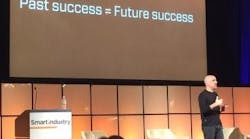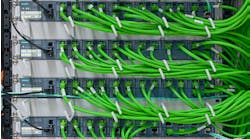Like many fellow conference presenters and many conference attendees, Keywell views data as a living entity. “Where is data today…where is data going?” he hypothetically posited before remind the audience, repeatedly, that there is untold opportunity nestled within this live information.
And, he added, traditional approaches to mine this opportunity are failing.
The digital revolution exposes faulty value propositions within many enterprises, said the speaker. “We believe that with most companies in major areas of industry—agriculture, aerospace, etc.—the core that brought them to leadership is not technology. What brought them to the head of the game is excellence in delivering products and services to customers.”
Those leading companies that fully embrace the digital transformation, Keywell believes, will thrive. They are thriving. And those providers that enable these companies to do so will thrive in tandem. “Someone has to serve industry with profitable outcomes,” he said, describing this service as data science translated into human action.
And there’s a whole lot of data.
A focus on outcomes
“The data being created by sensors is unlike anything we’ve ever seen,” said the Chicago-based co-founder of Groupon, Lightbank and other successful startups. “It’s hard to articulate the quantity of data and the opportunities that come from it.” Likewise, it is hard to process that data, which is good for those in the business of doing so. The mountain of information generated by modern machinery must be ingested, normalized and connected to devices. It must be transferred to the cloud and presented in a proper format to data scientists who—when they find patterns of interest—must deliver guidance on how to properly act on it.
“Our opinion is that the end user will not make these decisions,” said Keywell. “They want to pay a dollar to make two dollars.” The locomotive operator just wants to know that the locomotive will not break down in the dessert.
This mindset of allowing customers to buy the outcome, rather than all the choices that go into it, is increasingly popular as more information becomes available (and this information becomes more difficult to decipher).
The trick for the entrepreneur, of course, is getting into the industries rather than trying to disrupt them from the outside. “When we see opportunity on the inside, we must convince these major companies that what we build solves problems.” To do so, Keywell recommends partnering with leaders—the concept of collaborative disruption—and making them recognize both the needs they have and the value of the solution you’re offering.
Is the need increased productivity? Boosted safety? Or reduced unplanned downtime? Is the desire to no longer get to the gate and be told that you’re waiting on a part? Or the basic need to make trains safer? “All these things are possible because of data,” said the CEO. “Smart locomotives will save lives. Or imagine optimizing wind turbines to the point where you can start shutting down coal-fired plants. There are environmental components to this.”
There was no product at the core of this keynote presentation. Nor was there a service in the traditional sense. Rather, Keywell advocated a broader concept—delivering to enterprises the concept of solving problems. “This is the last frontier of value-creation in industry. There is extraordinary opportunity in how humans can make better decisions.”
And there is extraordinary opportunity in helping those humans make those decisions.


